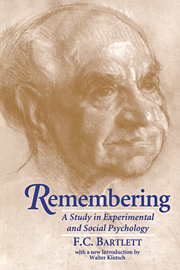Book contents
- Frontmatter
- Contents
- Biography of Sir Frederic C. Bartlett
- Introduction by Walter Kintsch
- Preface
- PART I EXPERIMENTAL STUDIES
- PART II REMEMBERING AS A STUDY IN SOCIAL PSYCHOLOGY
- Chapter XIII Social Psychology
- Chapter XIV Social Psychology and the Matter of Recall
- Chapter XV Social Psychology and the Manner of Recall
- Chapter XVI Conventionalisation
- Chapter XVII The Notion of a Collective Unconscious
- Chapter XVIII The Basis of Social Recall
- Chapter XIX A Summary and Some Conclusions
- Index
- Plate section
Chapter XIX - A Summary and Some Conclusions
Published online by Cambridge University Press: 04 August 2010
- Frontmatter
- Contents
- Biography of Sir Frederic C. Bartlett
- Introduction by Walter Kintsch
- Preface
- PART I EXPERIMENTAL STUDIES
- PART II REMEMBERING AS A STUDY IN SOCIAL PSYCHOLOGY
- Chapter XIII Social Psychology
- Chapter XIV Social Psychology and the Matter of Recall
- Chapter XV Social Psychology and the Manner of Recall
- Chapter XVI Conventionalisation
- Chapter XVII The Notion of a Collective Unconscious
- Chapter XVIII The Basis of Social Recall
- Chapter XIX A Summary and Some Conclusions
- Index
- Plate section
Summary
A RE-STATEMENT OF THE GENERAL POSITION
The detail and conclusions of both parts of this study have now been presented. At the risk of some repetition, it seems desirable to bring together the main results, since these touch upon a very large number of problems, but nevertheless present a coherent picture of the development of human response to the demands of external environment.
The picture is one of human beings confronted by a world in which they can live and be masters only as they learn to match its infinite diversity by increasing delicacy of response, and as they discover ways of escape from the complete sway of immediate circumstances. The psychologist who is concerned with the processes of recall comes to his problems only when an immense amount of this necessary development has already been achieved. Already the long struggle which results in the specialisation of the senses has attained its main ends, already the organism with which the psychologist is concerned has discovered how to utilise the past in such phenomena as those of lowered threshold, of chain and conditioned reflexes, of ‘schematic’ determination, and in the sequences of relatively fixed habit. But these, all necessary in their way, still cramp and confine man's activities. For in them all the past operates en masse, and the series is of greater weight than its elements. Moreover in many of them the past retains its constraining capacity in the form of relatively fixed sequences which cannot readily be broken.
- Type
- Chapter
- Information
- RememberingA Study in Experimental and Social Psychology, pp. 301 - 314Publisher: Cambridge University PressPrint publication year: 1995



